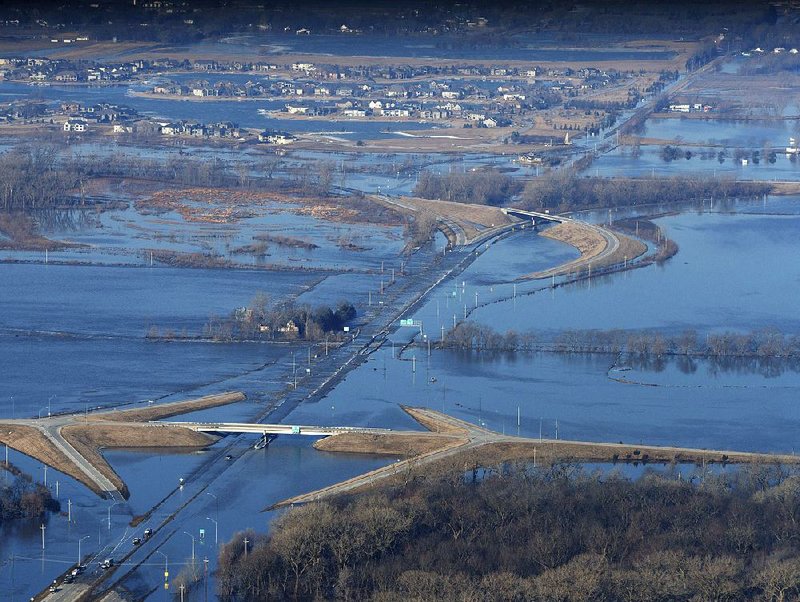ST. LOUIS -- Residents in parts of southwestern Iowa were forced out of their homes Sunday as a torrent of Missouri River water flowed over and through levees.
Late-winter floods have prompted leaders to declare states of emergency across the Midwest, where officials have confirmed two flood-related deaths. Hundreds of people across Iowa and Nebraska have been displaced.
The surging water was fueled by a powerful hurricane-like winter storm -- what the National Weather Service called a "bomb cyclone." The resulting flooding was particularly intense because the rain fell on snow that had not melted yet, said Brian Barjenbruch, the science and operations officer for the weather service office in Omaha, Neb.
"And the ground was completely frozen," he said in an interview. "It's almost like all of this rain was falling, melting snow, and every last drop had to run off."
The water overwhelmed infrastructure, threatened a nuclear power plant and cut off access to some towns and cities. In Nebraska, Gov. Pete Ricketts said the effects of the "devastating flooding ... could last for quite some time."
In Iowa, the Missouri River reached 30.2 feet Sunday in Fremont County in the state's far southwestern corner, 2 feet above the record set in 2011. People in the towns of Bartlett and Thurman were being evacuated as levees were breached and topped.
County Emergency Management Director Mike Crecelius said it wasn't just the amount of the water that created a danger, but also the swiftness of the current.
"This wasn't a gradual rise," Crecelius said. "It's flowing fast and it's open country -- there's nothing there to slow it down."
Thurman has about 200 residents. About 50 people live in Bartlett.
Aleido Rojas Galan, 52, of Norfolk, Neb., was confirmed as the second flood-related death. He was swept away Friday night in southwestern Iowa, when the vehicle he was in went around a barricade. James Wilke, 50, of Columbus, Neb., died Thursday.
"It is some of the worst flooding that we've seen in many years," Barjenbruch said of eastern Nebraska and western Iowa. "In some locations, it's the worst flooding on record on many of these river gauges."
Lucinda Parker of Iowa Homeland Security and Emergency Management said nearly 2,000 people have been evacuated at eight Iowa locations since flooding began last week. Most were staying with friends or family. Seven shelters set up for flood victims held just a couple dozen people Saturday night.
Nearly 300 people have been rescued from high water across the state.
In Nebraska, the Missouri River flooded Offutt Air Force Base, leaving about one-third of it underwater on Sunday. Spokesman Tech. Sgt. Rachelle Blake told the Omaha World-Herald that 60 buildings, mostly on the south end of the base, have been damaged, including about 30 inundated with as much as 8 feet of water.
The Cooper Nuclear Station, a power plant that sits along the Missouri River in southeast Nebraska, may be forced to close down as the water continues to rise, the facility's officials said. Employees over the weekend were piling sandbags along the levee that protects the plant and around the building's doorways, the Omaha World-Herald reported.
Officials said a shutdown wouldn't harm the nuclear reactor.
Hundreds of people remained out of their homes in Nebraska, where floodwaters reached record levels at 17 locations. The Nebraska Emergency Management Agency highlighted some remarkably high crests. The Missouri River was expected to reach 41 feet in Plattsmouth on Sunday -- 4 feet above the record set in 2011.
The Elkhorn River got to 24.6 feet Saturday in Waterloo, breaking the 1962 record by 5½ feet.
In hard-hit Sarpy County, Neb., up to 500 homes have been damaged, including some cabins along a lake, said Greg London of the sheriff's office. The damage followed breaches of levees along the Platte River on Thursday and Saturday, and a Missouri River levee break on Thursday. The two rivers converge there.
London said many of the damaged homes are wet up to the roof line and likely are ruined.
"This area's had flooding before, but not of this magnitude," London said. "This is unprecedented."
Downstream communities in Kansas and Missouri were bracing for likely flooding.
In St. Joseph, Mo., home to 76,000 people, volunteers were helping to fill sandbags to help secure a levee protecting an industrial area. Calls were out for even more volunteers in hopes of filling 150,000 sandbags by Tuesday, when the Missouri River is expected to climb to 27 feet -- 10 feet above technical flood stage.

Flooding was causing problems for passenger train service between Kansas City, Mo., and St. Louis. Amtrak said Sunday that its Missouri River Runner service between the state's two largest cities was experiencing delays of up to five hours because of flooding and rail congestion. All Missouri River Runner trains will be canceled today. The service typically travels twice daily between the two metropolitan areas.
The rising Mississippi River also was creating concern. The river was already at major flood level along the Iowa-Illinois border, closing roads and highways and swamping thousands of acres of farmland. Moderate Mississippi River flooding was expected in several Missouri cities, including St. Louis.
Flooding has also been reported in Minnesota, South Dakota and Wisconsin. In Green Bay, Wis., officials said residents who evacuated their homes can return now that floodwaters have receded there.
Information for this article was contributed by Jim Salter and Jeff Baenen of The Associated Press and by Mark Berman and Reis Thebault of The Washington Post.
A Section on 03/18/2019
